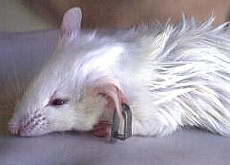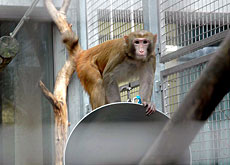Animal experimentation on the rise again

Animal testing in Switzerland is increasing, according to a leading organisation, the 3R Research Foundation.
The organisation, which strives to promote alternatives to animal tests, made the announcement as part of an event to mark its 20th anniversary.
Even though 3R witnessed an 80 per cent drop from two million to 450,000 animals used in testing during its first 17 years of its existence, the figure was up to half a million in 2005.
The organisation noted on Wednesday that there was still a lot of room for improvement.
Hugo Wick, a former parliamentarian and founder member of the think tank, said genetically modified animals were responsible.
“When studying genetic defects, knockout mice are often used in tests,” said Wick.
These are laboratory mice in which researchers have inactivated – or knocked out – an existing gene by replacing it or disrupting it with an artificial piece of DNA.
This loss of gene activity often causes changes in the mouse’s appearance, behaviour, physical and biochemical characteristics. Several thousands of such mice are usually required for such a project.
The 3R Foundation was set up in 1987 and supports research aimed at developing or refining alternative methods to animal experimentation.
European first
Christine Egerszegi-Obrist, this year’s speaker in the House of Representatives and foundation vice-president, called the organisation a Europe-wide first.
“It was the first private-public partnership in the field of animal testing; there are many others now but none can match the financing of research,” she said, speaking at the anniversary conference.
Egerszegi-Obrist compared the situation in Switzerland with that in Britain.
“In England, researchers testing on animals face daily threats from animal activists and the state rules have been hardened,” she said.
In contrast, the Swiss “proved that [the different stakeholders] were ready to have a dialogue”, whether they were from the industry, animal protection organisations or politicians.
This readiness to engage in dialogue was “typically Swiss”, Egerszegi-Obrist said.
Industry voice
Thomas Cueni of the Swiss pharmaceutical association, Interpharma, agreed with Egerszegi-Obrist about the “Swissness” of the country’s approach, saying that it was rooted in its tradition of direct democracy.
For his part, Cueni added that he was always impressed with how much respect the companies that he represents treat animals during experiments.
He added that the whole area of animal experimentation was naturally thorny but that Interpharma supported the 3R foundation’s work.
“It always poses a dilemma – how do you protect people and avoid animals from suffering unnecessarily?” he asked.
swissinfo, Faryal Mirza
The 3R Research Foundation Switzerland supports projects to the sum of SFr700,000 ($584,000) a year.
So far, it has distributed nearly SFr14 million to researchers. Half of this came from the Swiss government, the other half from Interpharma.
Its administrative board has nine members: three parliamentarians, two representatives from the animal protection sector, two from Interpharma and two from the Federal Veterinary Office.
Animal experiments are defined as any procedure using animals with the target of verifying a scientific hypothesis; to observe the effects of a particular procedure on an animal; to test certain substances; to obtain or test cells, organs or body fluids; for educational purposes.
Persons wanting to conduct an experiment require an authorisation from the responsible cantonal authority.
The 3Rs- a concept developed by British scientists in 1959 – governs the humane use of animals in the testing laboratory.
They stand for: Replacement, Reduction and Refinement.
Replacement: requires questioning the meaningfulness of the experiment and whether live animals really need to be used.
Reduction: requests that the number of animals used be kept to a minimum.
Refinement: requires that animals that are used should be inflicted with the least possible distress and pain.
The concept is still not accepted in all industrialised countries but acceptance is growing.

In compliance with the JTI standards
More: SWI swissinfo.ch certified by the Journalism Trust Initiative











You can find an overview of ongoing debates with our journalists here . Please join us!
If you want to start a conversation about a topic raised in this article or want to report factual errors, email us at english@swissinfo.ch.